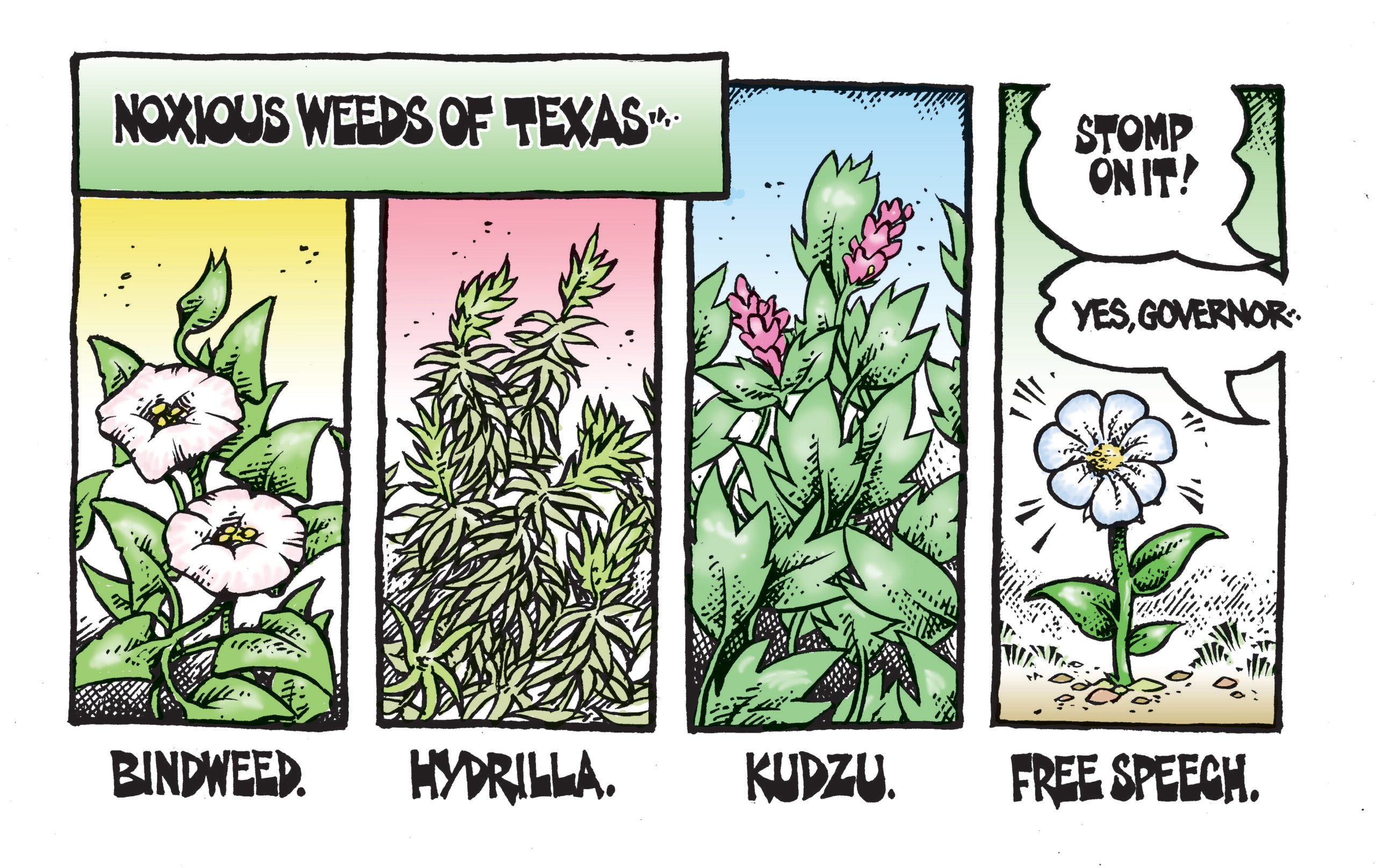ustxtxb_obs_1967_07_21_50_00010-00000_000.pdf
Page 7
Pancho Madrano of Washington, D. C., a U.A.W. official; and H. A. Moon, Dallas, also with the U.A.W. Again he was urged to advocate an election to settle the Starr county issue. “He said, ‘No’,” Padilla reported afterwards. Moon quoted the governor as saying he was neutral in the dispute. Padilla asked the governor to see that trials are held soon for those who have charges filed against them. Connally, Padilla said, promised that he would do what he could about that. Connally’s policy of apparent neutrality was put aside one night in Laredo last month. Addressing the state convention of the League of United Latin-American Citizens, he warned of “These itinerant, paid purveyors of division, distrust, and dissension [who] would attempt to paint some of our people off into a corner, out of the mainstream of our society, by falsely convincing them that they’re better off alone.” On June 30 the governor was given a number of petitions that had been signed by 266 faculty members of Texas colleges and universities, protesting alleged violations of civil rights in the Valley. Meanwhile, the melon harvest has been concluded in Starr county. Farmers say the crop was the best in history, or at least in recent years. Union leaders and supporters had hoped to make some headway in their movement during May, June, and July, the months of the harvest; melons are the most perishable of Starr county’s crops, so that season is most propitious for the union to apply pressure. Negotiations with Virjilio Guerra, the one grower in the county who has signed an agreement in May recognizing the union, have not lead to a contract. Guerra operates a farm that hires six full-time employees and during the melon season employs 80 workers. He is the brother of Roma Mayor Joe Guerra, an Old Party leader in the county. The Old Party has been out of power for 20 years. Guerra’s recognition of the union is seen as a step toward embarrassing the rival New Party, which controls the courthouse where the subcommittee hearings were held. G.O. Dionisio Sanchez Wants a Well El Paso The March 4 issue of Correo, a Juarez newspaper, had a feature story on Dionisio Sanchez Losoya. The article, entitled “Why Did They Go to the Revolution?”, told how young Dionisio Sanchez went to war in 1911 and followed Francisco Madero “for liberty and justice.” The photograph accompanying the article showed the 20-year-old soldier riding into Mexico City in 191.4 beside Emiliano Zapata and General Francisco Villa. But Mr. Sanchez is not a revolutionary any more. He is 56 years older than the young man in the photograph, and what he wants now is a water well. Mr. Sanchez lives in the small town of Villa Ahumada, 85 miles south of Juarez. Since the days of the Revolution he has been concerned about the poor of Mexico and the means of helping them. He is a farmer, and poor himself. He is convinced that water is crucial for the people in the state of Chihuahua: with water wells the dry lands of Northern Mexico could be made to support the poor. They could form granjas, or community farms, and raise crops to feed themselves. They could stay in the country rather than being forced to go to border towns such as Juarez where they become beggars on the streets. Water wells, granjas, these are what this patient, hard-working ex-revolutionary believes can offer hope to the poor. SIX YEARS AGO Mr. Sanchez started trying to get a well for himself and a group of fifteen families that live outside Villa Ahumada. He believed that with a well they could grow two crops a year and be self-sustaining. He made several trips to Mexico City, but since he has 10 The Texas Observer “FIELL HATH NO FURY LIKE A CATFISH SCORNED” Eat Some At THE PIER ON LAKE AUSTIN Jim Walls, Prop. no political influence, and dresses as a farmer, he could no get past the outer offices of officials. Last year Mr. Sanchez saw Licenciado Juan Gil Preciado, the Mexican minister of agriculture, when the minister was in Juarez. Lic. Gil promised to dig the well free within the year. And Gil kept his promise: in October a department crew came to Villa Ahumada and dug a well which, says Mr. Sanchez, has 80 meters of water and is good not only for irrigation but for drinking. Mr. Sanchez then made another trip to Mexico City this time to finance a pump and motor for the well through El Banco Credito Ejidal. The bank agreed to finance the pump and motor over a Elroy Bode four-year period, but first required completion of an official document called a prueba a sample or “proof” which states that a well does exist, that it can produce sufficient water for irrigation, etc. When Mr. Sanchez again contacted the department of agriculture about the prueba Mr. Preciado told him that although the department did test wells free it only had equipment to test eight-inch well pipes. Since the crew had installed a sixinch pipe at Villa Ahumada, Mr. Sanchez would have to get the well tested at his own expense. Mr. Sanchez came back to Juarez and located a garage Talleres de Santiago that had the necessary equipment to test six-inch well pipes. The cost, the garage owner said, of going from Juarez to Villa Ahumada and doing the test was 5,100 pesos, or $408. Mr. Sanchez was in El Paso three weeks ago, still looking for a way to get his well operating in spite of his not having $408 for the prueba. He hopes that he can find someone who can help him. Among the personal papers which he carries inside his denim jacket are letters of recommendation dating back over the past thirty-five years. They are all highly corn plimentary of Mr. Sanchez and show that he has built farm houses, handled dynamite, and worked as a miner. He worked fourteen years as a foreman for the Mexican national commission of irrigation; he worked in California during World War II. Mr. Sanchez emphasized that he has worked all his life and is not looking for a handout. “I do not want any money; I do not even want money to pass through my hands. All I want is the prueba so that we can get our well. If anyone has any money, they can give it to Talleres de Santiago.” When asked why he thought the department of agriculture had put in a sixinch pipe when the eight-inch pipe was standard, Mr. Sanchez shrugged and said, “Who knows? Perhaps they just wanted to do the job as cheaply as possible and thought they would never hear any more about it.” He told of the politicians who had made fun of his project who had given him the run-around during the past six years. Because of the difficulties in getting his well, Mr. Sanchez has been advised to give up the idea of trying to farm and move to Juarez. But he doesn’t want to. He says that with water he can raise his own food and feed others as well. “In Juarez the poor just end up looking in the garbage cans . . . the rich are not interested in anybody but the rich,” he said. M R. SANCHEZ IS tired and bitter, but he indicated he will not quit. He tapped his papers on his knee and said, “We are old revolutionaries, and we have been fighting the last six years for a well. When the Revolution was over the generals took anything they wantedranches, fincas, livestock. Today there are men who do not even know the smell of gunpowder who are living like kings . . . We went to the Revolution for a piece of land and the water to seed it. I swear I will bring justice to those men who, with their hands, still want to work the earth.” So he continues to wait without money, influence, or his well.


